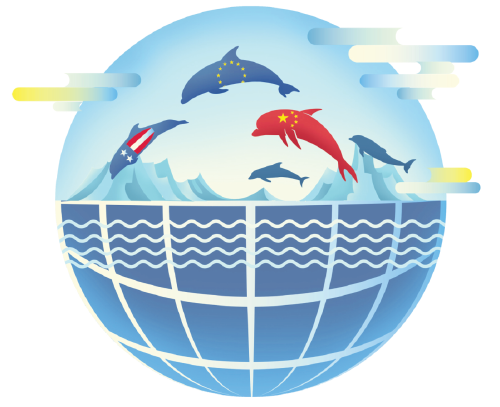Movers and shakers
Relations between three largest economies will shape the world in the post-pandemic era


The world landscape today is going through significant changes. The past four decades have witnessed the global economy's center of gravity shift to the East. In 2009, China's GDP accounted for only one-third that of the United States, measured by market exchange rates. The ratio had increased to two-thirds by 2019.
According to a forecast by the International Monetary Fund in October 2019, China's GDP in 2020 was expected to be 68.4 percent that of the US. After the outbreak of the novel coronavirus at the beginning of last year, the IMF estimated in October 2020 that the ratio had increased to 73.2 percent.
With the size of the Chinese economy catching up with that of the US, the competition between the two powers has become more complicated. Under the Donald Trump administration, the US demonstrated a strong determination to guard its hegemonic status.
With China and the US now at loggerheads on many fronts, the European Union has become more skillful, principled and independent in response. But the EU is deeply mired in the pandemic and its economy has taken a heavy blow. It is also facing several internal and external challenges. For example, Brexit aroused skepticism toward European integration in some EU countries, and the US and Russia have both adopted a divide-and-rule approach to the EU.
Yet despite the challenges, it is important to note that the history of the integration of Europe is one that has been driven and boosted by one crisis after another. The European Coal and Steel Community and the European Economic Community were created in the context of Europe's recovery after World War II. The Single Market was engineered in response to the economic downturn in the 1970s. The creation of the European currency was in response to the reunification of Germany. The European Stability Mechanism was a product of the eurozone debt crisis.
But despite the unswerving political commitment to building a unified European, the existence of the European economy as a whole and the currency union has been wobbling in the absence of a fiscal union. The good news is that the historic recovery plan, Next Generation EU, worth 750 billion euros ($906 billion) agreed by the EU in July 2020, marked an important step forward-the three pillars of a single currency, a central bank and credible commitment to unified fiscal policies have now been put in place. In its recovery plan, the EU announced the issuance of sovereign debt bonds across Europe to seek key support, which will make Europe a risk-free asset provider second only to the US. At the same time, the euro, a currency that has long been viewed as unpromising, is embarking on an unprecedented new journey.
The Trump administration transformed the US-Europe relationship in a bad way. As a result, Europe has lost confidence in the US, despite calls from the new Biden administration that the US relationship with its European allies be repaired. INTEX SAS, a special purpose trade transaction tool jointly designed by Germany, France and the United Kingdom in 2019 to bypass the US dollar system, marked the starting point of a path toward a more independent Europe. In December 2020, the EU released the Digital Service Act and the Digital Market Act, and aimed at restoring order on the internet. While discussing with the US about a trans-Atlantic new deal for a global reform agenda, Europe wasted no time in concluding the negotiations on an investment deal with China. All these moves highlight the independent policy of the EU.
German Foreign Minister Heiko Maas has said in an interview last October that, the ability to deal with the crises on our own doorstep, alone if necessary, is in EU's fundamental security interests. "The world has changed in four years," said French Foreign Minister Jean-Yves Le Drian last November, adding that "we will have to build a new trans-Atlantic relationship, which will be a new partnership."
Despite some persistent weaknesses, the EU has risen as a key player in the international arena with its economic and technological clout, outstanding international rule-making capabilities, commitment to green development and its collective decision-making capability that has taken the level of European integration to a historical new level during the COVID-19 pandemic.
With the UK leaving, the EU has gained enhanced internal solidarity and cohesion. It has maintained its status as one of the world's three largest economies despite the pandemic. Its economic power lays a solid political foundation for it. A strong EU that pursues solidarity, autonomy and ambitious goals will certainly represent one of the poles in a multi-polar world.
Though there are some other economies that boast capabilities in certain areas, overall speaking, the post-pandemic era will see an emerging order dominated by China, the US and Europe, with the coexistence of several mid-level economies. Therefore, the development of the world will largely be shaped by the relations between these countries.
The author is director of the Institute of World Economics and Politics at the Chinese Academy of Social Sciences and the leading expert of the National Institute for Global Strategy. The author contributed this article to China Watch, a think tank powered by China Daily. The views do not necessarily reflect those of China Daily.

































